On a blustery winter evening, my partner and I hop on the uptown C train all the way to Washington Heights, one of the last neighborhoods before you hit the northern tip of Manhattan. We had originally planned to fly home for the holidays that night, but I moved our flights around so that we could attend a very special event.
We arrive at the home of Karina Garcia and Lalo Rodriguez, the founders of Cocina Consuelo, a unique supper club experience featuring elevated takes on traditional Mexican cuisine. They lead us to the dining room, which is dim, primarily illuminated by a Christmas tree in the corner. The low light makes us think we’re seeing double when the rest of the guests arrive; it turns out our fellow diners tonight are a pair of identical twins and their husbands.
Before the meal starts, Lalo surveys the room for interest in a mezcal pairing. The beverages are stored in nondescript plastic water bottles, but the smoky aroma is undeniably that of high-quality mezcal. I’ve opted for a Ponche Navideño, or Christmas punch, a Mexican drink that is popular during the holidays. It warms me to my core. My anticipation heightens for the meal to come.
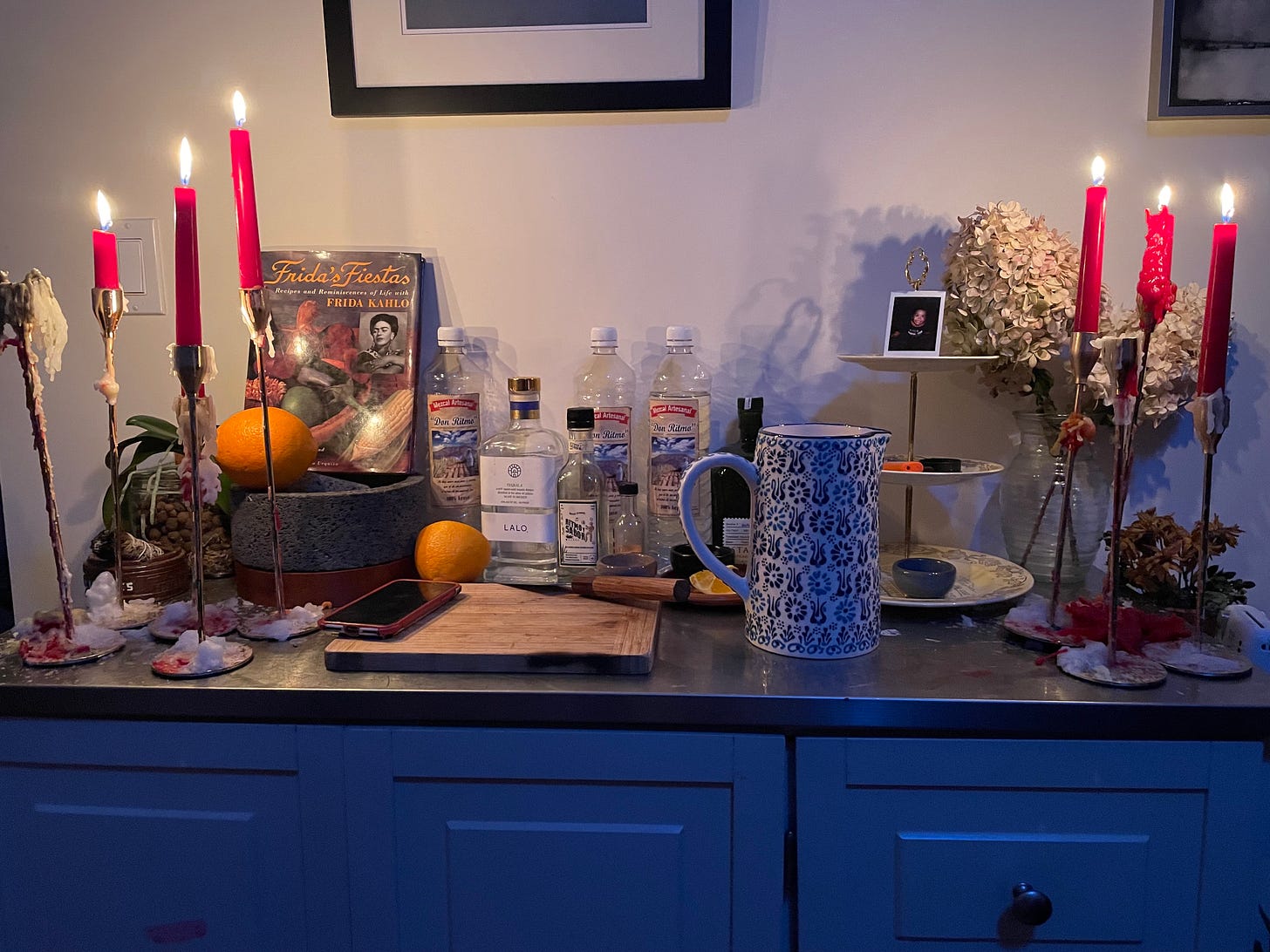
Meet Karina
Karina has been cooking for as long as she can remember. Born and raised in the Dominican Republic for the first ten years of her life, she was exposed to a variety of flavors ranging from Spanish to West African. She enjoyed learning about different cultures through their food, and relished the experience of sharing meals with her family around the table. I was surprised to learn that her first memory of cooking actually involved an accident in which a pot of simmering beans fell on her as she was stirring them. Hardy from a young age, Karina was not dissuaded from spending all her free time in the kitchen.
It was after she moved to New York City in the seventh grade, to the neighborhood of Hamilton Heights in northern Manhattan, that she started to view cooking as a venture. Her entrepreneurial spirit bloomed when her mother refused to buy her a cell phone like the ones her friends had. She took matters into her own hands: she borrowed $5, acquired cake mix, sold the treats at school, and bought herself the cell phone. Ever since then, she has asked herself, “How can I make money from cooking?”
Karina cooked for her friends and peers throughout middle school and high school, and eventually went on to culinary school. She moved her way up through the restaurant industry, starting out as a dishwasher, then a busser, then a line cook. While she pursued a degree in business management, she rounded out her restaurant experience by taking on front-of-house roles as well. By the time she landed a position as a kitchen runner at the hallowed Eleven Madison Park, she had experienced firsthand just about every aspect of hospitality.
She met her husband Lalo Rodriguez, a traveling musician from Mexico, when they were both working at Ristorante Morini on the Upper East Side (now closed). When we get to chatting between courses at the supper club she tells me matter-of-factly that she didn’t take to him initially, because he worked slowly in his role as a busboy. Shortly after they met, he casually invited her to visit his grandmother’s house in Puebla, not expecting her to accept. That invitation changed everything: they fell in love and got married. Throughout their courtship, Karina would often prepare homestyle Mexican food for Lalo whenever he felt homesick.
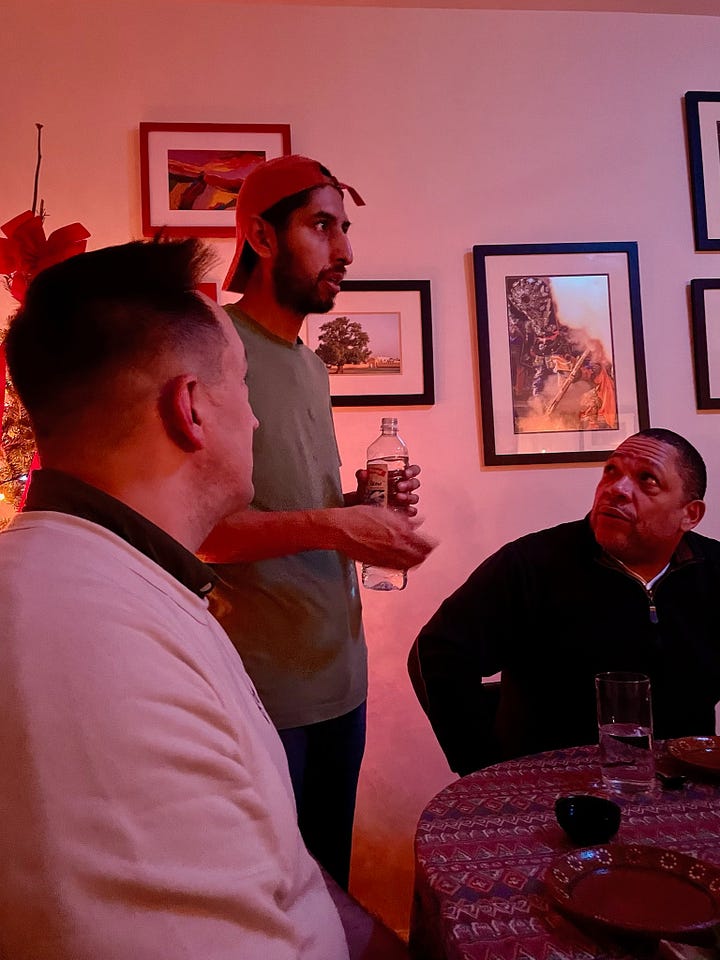
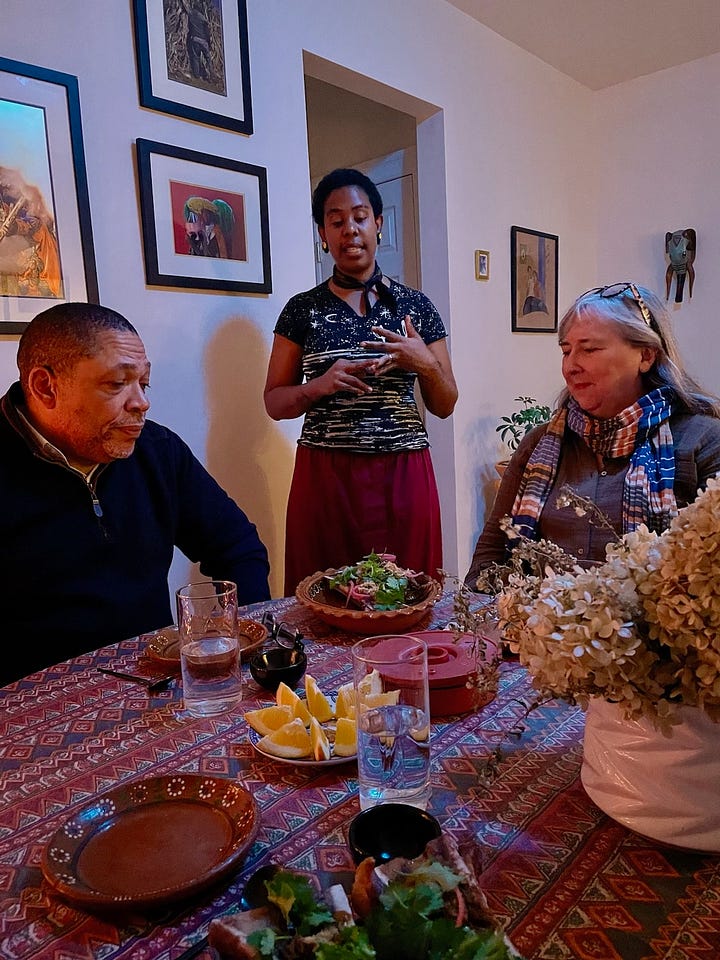
Cocina Consuelo
Karina’s fascination with Mexican cuisine and culture started when she watched the highly acclaimed 1992 film Like Water For Chocolate. However, off-screen she didn’t have a lot to work from at the time. She didn’t grow up with ready access to authentic Mexican cuisine; what she could try was mostly Americanized. That changed when she began to travel to Mexico, when the Mexican food scene in New York expanded, and especially when she met Lalo.
Now her approach to Mexican food is through the eyes of her husband, informed by the way she sees his family dine and understanding why they eat the food that they eat. Her own recipes are primarily based on the food she encountered in the gulf regions of Mexico (Veracruz, Yucatán), as well as Puebla where Lalo’s family is located.
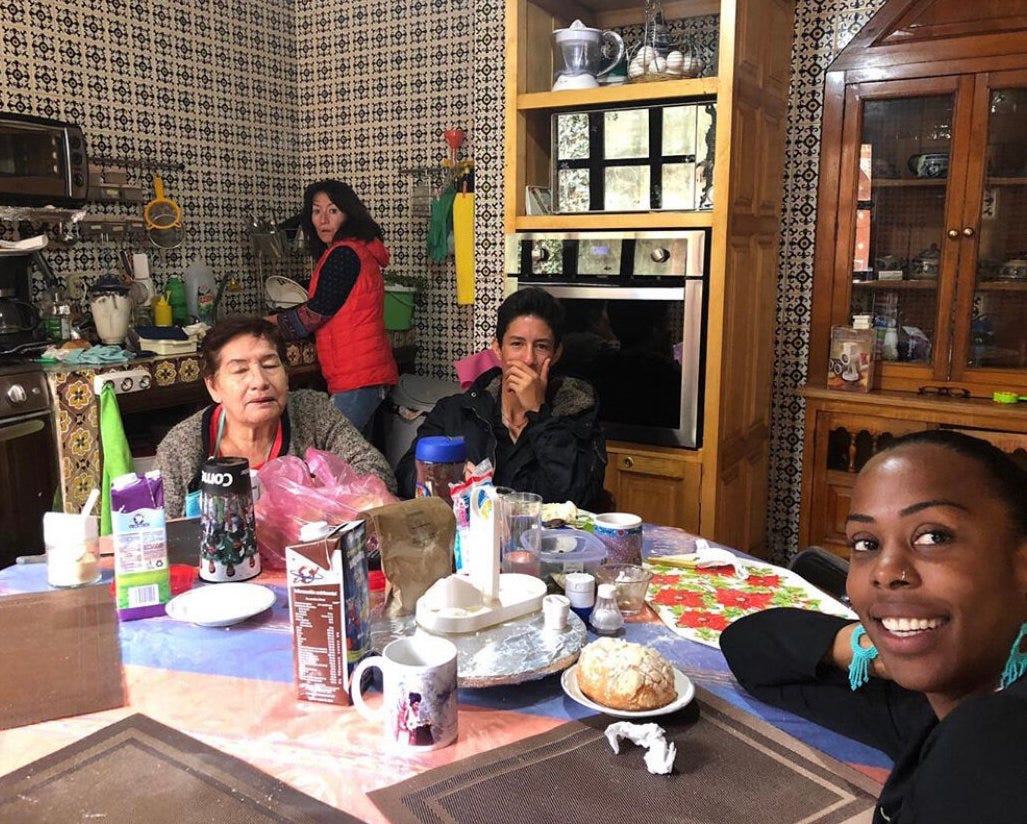
When COVID hit in 2020, Karina and Lalo were furloughed from their jobs at Eleven Madison Park and Cosme respectively. By June of 2020, they were going stir crazy in their apartment and rapidly running out of money. As they brainstormed their next move, Lalo encouraged to share her Mexican cooking with the world, confident that other people would enjoy her food as much as he did.
They started by selling Karina’s famous birria (braised meat stew) tacos for takeout and delivery. She also baked her decadent but laborious dulce de leche donuts, known as kalacremes, earning $400/week selling to a local cafe and $400/week selling directly. Soon people started asking for more orders of tacos and kalacremes, then different dishes, then booking dinner parties, catering gigs, and private events. Karina did not plan for how quickly the project grew; the demand exploded and the venture evolved organically. She characterized that period of rolling with the punches in three words, “It just happened.”
Of course, that straightforward statement belies the thought and care that Karina puts into the entire process. She believes that food is personal, that it brings people together, and that there is an immense responsibility in nurturing people by feeding them. Her philosophies on food and intentionality towards it are part of the reason that her project has had such wide appeal. Her dishes convey her stories and, by extension, herself, and that authenticity speaks to people. In her own words, “I’m bringing who I am to the table.”
I ask her how she balances the traditional “grandma cooking” aspects of the cuisine with a more modern approach. Her response calls out the false dichotomy in my question: Mexican home cooking already employs a lot of refined techniques. Echoing the Cooking with Mayoras class that I took in Mexico City, this style of cooking doesn’t get the appreciation it deserves because it’s usually done by female family members. They may not have time to focus on the plating, but the food is already elevated by way of fresh ingredients and sophisticated preparations. Furthermore, a lot of these “modern” techniques aren’t actually new — they’ve been around for centuries, and we’re just now creating a Eurocentric language around them.
Karina approaches all of this by trying to be highly cognizant of tradition and modernity, and in particular how they co-exist. In the supper club, she combines a hearty and comforting home-cooked meal with techniques that take time, such as her multi-day mole preparation. She applies extreme intentionality with everything that goes onto the plate, using only the best ingredients available, and aims to highlight how the food is already beautiful and elevated on its own. With those points in mind, and drawing on her background in fine dining, the intricate presentation is easy.
I experience her intentionality and storytelling firsthand during our meal at Cocina Consuelo. Our meal begins with the tacos that started it all: roasted bone marrow, a 15-hour birria (braised meat stew), salsa roja, and pickled onions wrapped in hand-pressed blue corn tortillas. That’s followed by scallops so fresh they taste as if they’ve swum onto the plate. They are served in their shell atop a bed of ginger butter and blanketed with a sourdough herb crumble. A dash of habañero provides heat, while a generous squeeze of lime juice creates an acidic balance to the perfect seafood course.
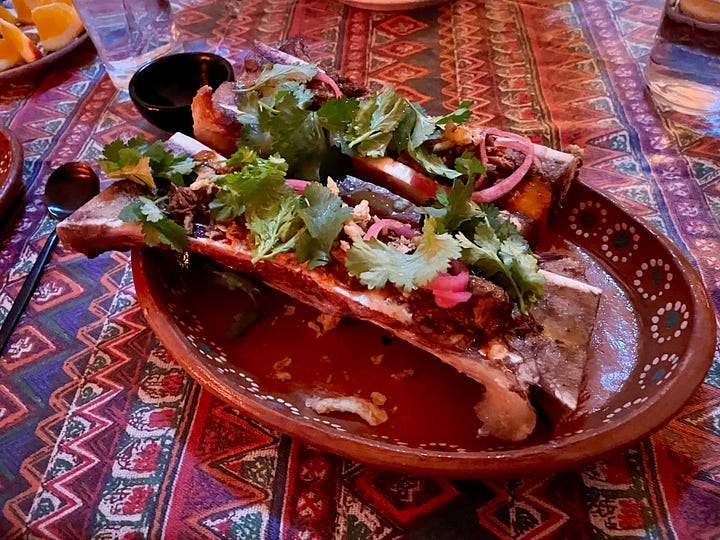
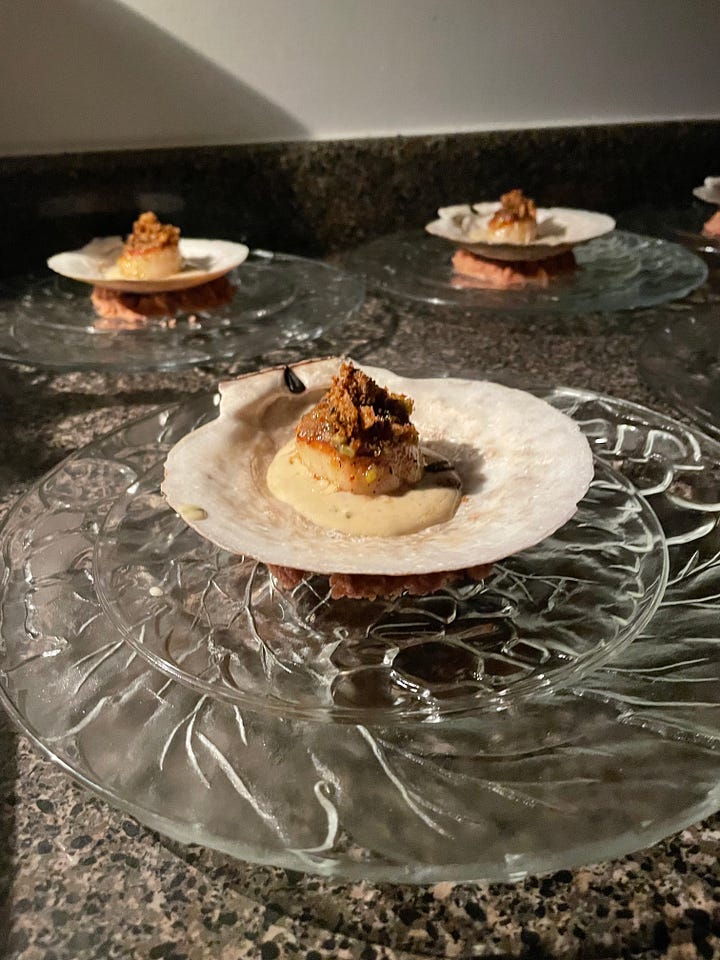
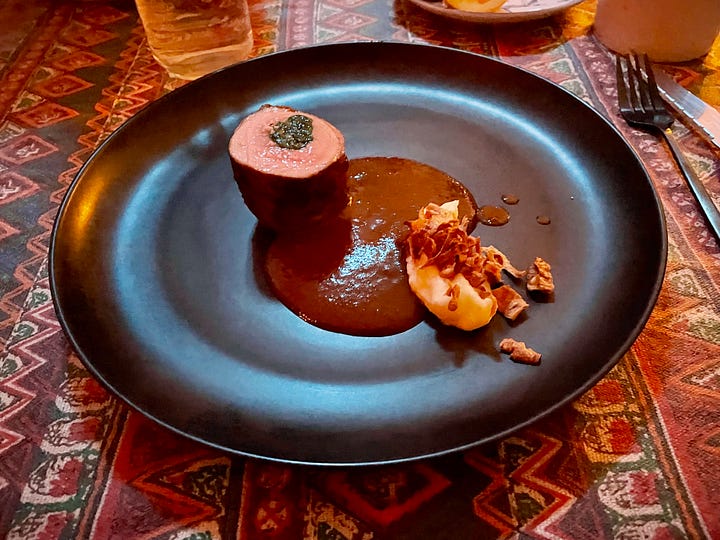
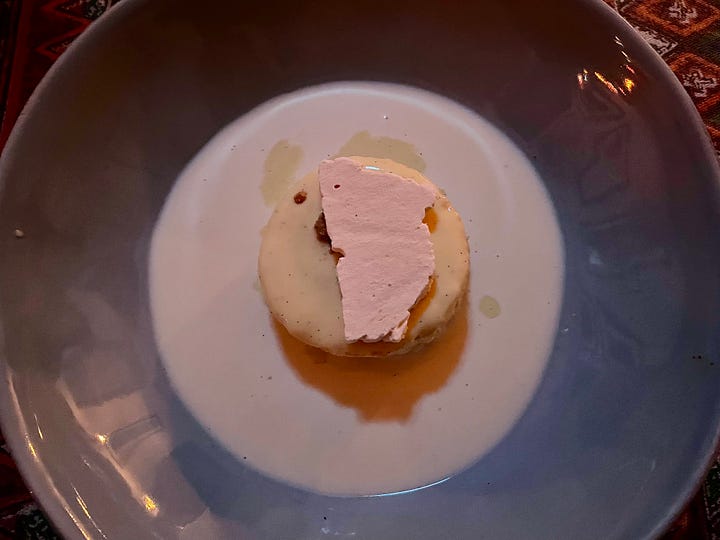
The final savory course is a masterpiece: Mole Poblano, one of the most famous dishes hailing from Puebla. It is prepared over multiple days by slowly incorporating chilis, fruits, nuts, seeds, and Mexican chocolate into a thick red sauce. It’s served in regional Talavera pottery alongside pork tenderloin and indigenous Mexican wild vegetables called quelites. The sweet elements of the sauce transition beautifully into the dessert course, a tres leches cake made with vanilla bean cream, caramelized apples, and roasted meringue.
Between the courses and the mezcal pairings the conversation enlivens, pausing only when the next dish is served and we are all stunned to silence by the flavors. I look around the table at people I probably would not have encountered if not for this supper club — strangers who now feel like friends. As we lick our plates clean, Karina and Lalo’s young daughter Yohualli arrives home and takes over hosting duties. She is not shy, she entertains us with a natural ease that probably comes from being surrounded by dinner guests her whole life. After the restaurant-quality meal we’ve just had, she reminds us that we are in somebody’s family home after all.
Paid leave advocacy
On top of cooking, Karina is also a passionate advocate for paid leave for parents. In a glaringly honest 2022 Glamour piece, Karina discussed the challenging period immediately after the birth of her daughter. A year ago, she was invited to the White House to share her story at a Women’s History Month brunch hosted by Vice President Kamala Harris. She recounted, “Last year, on May 12, I gave birth to my first daughter, Yohualli. Six days later I was working. Four nights a week I worked from midnight until 8 a.m., up when even my baby was sleeping. I had no paid leave. I had no choice. I shouldn’t have had to choose between my child and my livelihood.”
And while paid parental leave is a critical step the nation can take to support new mothers, it’s unlikely that Karina would sit still for very long. In her essay she states, “There is a part of me that always needs to feel productive, and creatively I’m in my element in the kitchen. It’s my happy place.” I ask how being a mother has impacted the two businesses that she runs from home. Karina replies that for the most part she has been able to juggle her professional life while enjoying motherhood and being accessible to her daughter.
However, after four years of cooking from her home kitchen, Karina hopes to be able to separate the mom from the wife from the chef from the friend from the host. The roles have muddled together, but as she and Lalo look towards expanding their family, she wants them to become more distinct. That’s why it’s so important that they open a brick and mortar restaurant and build a team that can manage the day-to-day operations, even if she has to step away for a while.
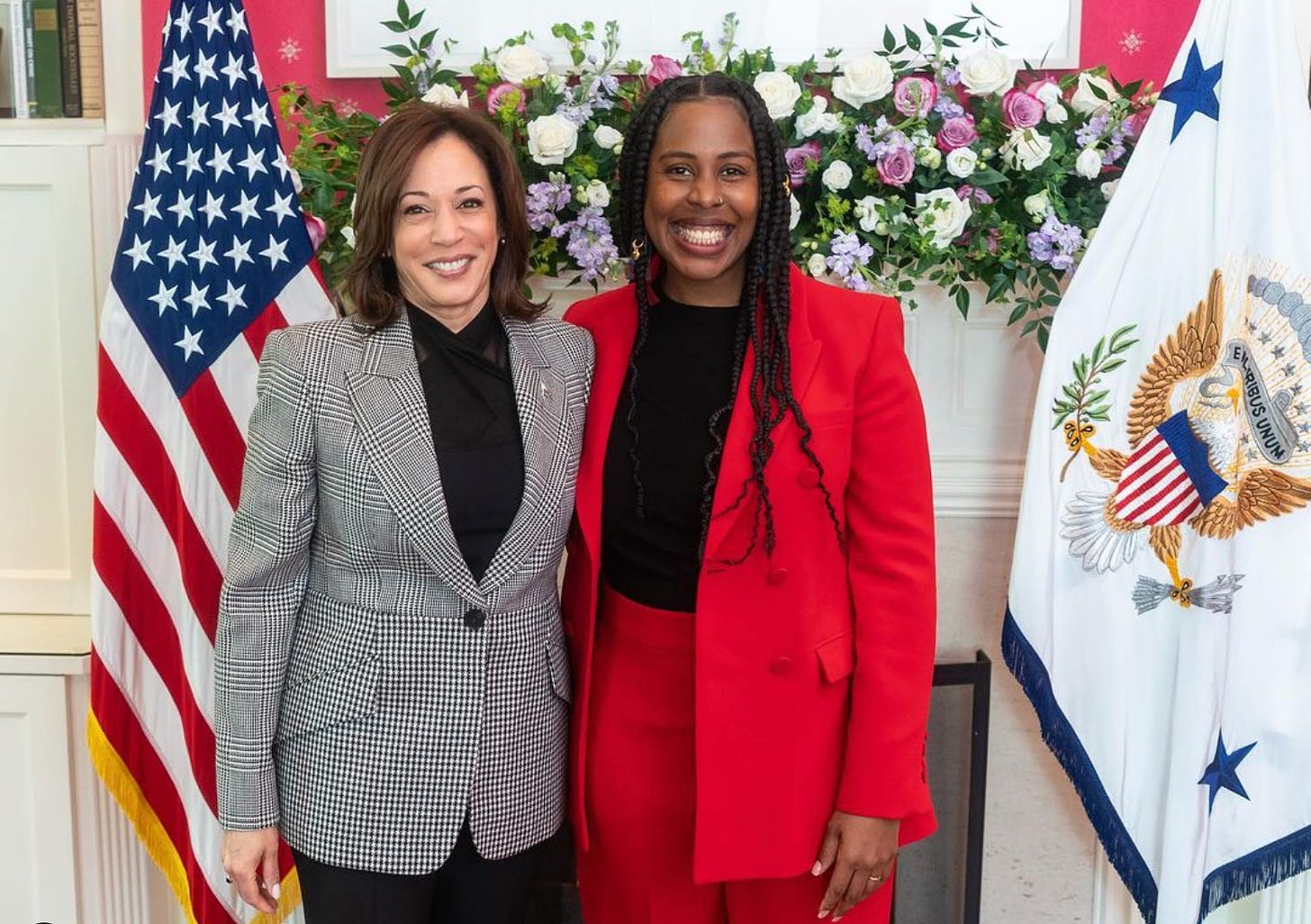
From popup to permanent
The brick and mortar restaurant will be named Consuelo after Karina’s grandfather, and will largely resemble the supper club. In lieu of a tasting menu (currently priced at $90/person), there will be an á la carte menu featuring fan favorites at a more accessible price point. The idea is to make everyone feel a part of something when they walk through the doors, by way of atmosphere, service, and high-quality homey meals.
Another philosophy that Karina wants to carry over from the supper club is around sustainability. She is very mindful about food waste, and has been able to mostly avoid it with the supper club, because she knows the attendance ahead of time. With the restaurant, she plans to keep food waste to a minimum by having a limited amount of each menu item. She would rather serve the freshest food possible and run out early than make too much and store it for several days. It comes down to being responsible about consumption, and expecting that guests will be willing to trade off availability of certain dishes for the highest quality food.
Finally, Karina hopes to maintain the intimate family feeling of the supper club while extending the community that she and Lalo have created from their home. Too many times a restaurant will open in a neighborhood without any regard for its history or the denizens who have been around for decades. This can often lead to transactional experiences that don’t feel rooted in the area at all. Consuelo will be located in Hamilton Heights, the neighborhood where Karina grew up and where her mother continues to live over thirty years later.
She describes the Heights as diverse and vibrant: the families foster a tight-knit community vibe while the young people from City College are contributing to a fresh and renewed feeling. When it came to deciding where to open her restaurant, Karina was adamant: “I wouldn’t want to open a restaurant anywhere else but there.” And she is focused on using her restaurant to bring people together. “The neighborhood is very diverse, I see this as a place where everyone can congregate, where everyone can gather and feel at home. It doesn’t matter where you’re coming from… You come to Consuelo and you feel connected.”
Thank you so much to Karina for taking the time to chat with me about her culinary ventures! And thanks doubly so for being an intentional restauranteur and an inspiring advocate for paid leave. Follow along on her journey on her Instagram, where she also announces future supper club seatings.
Lastly, congratulations to Karina, Lalo, and Yohualli for reaching their Kickstarter campaign goal! They have raised over $36,000 so far, which will be used to take their Consuelo from popup to permanent. There is still time to back their campaign for exciting rewards like a batch of kalacremes or dinner for two at the new restaurant! More details here.




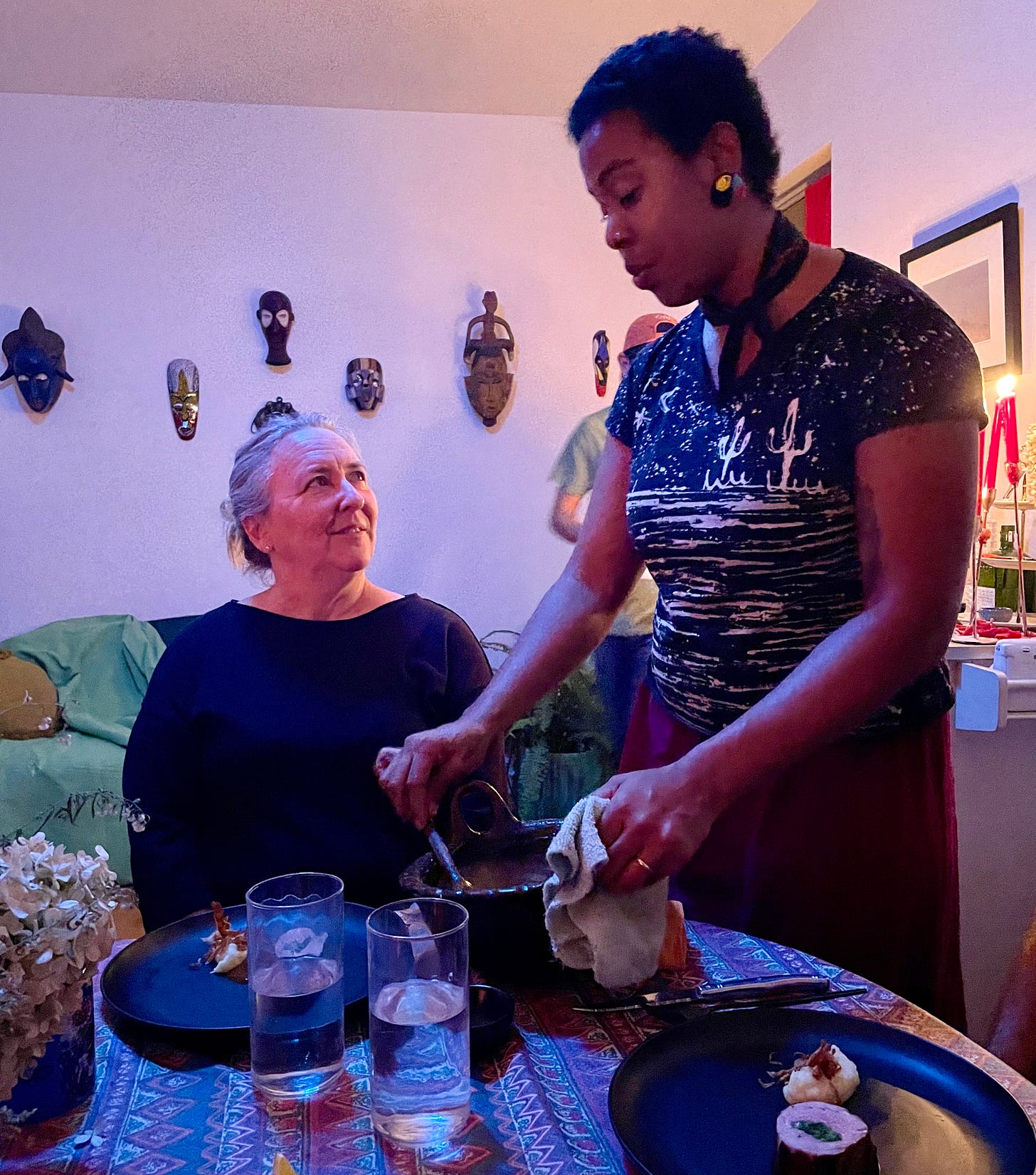
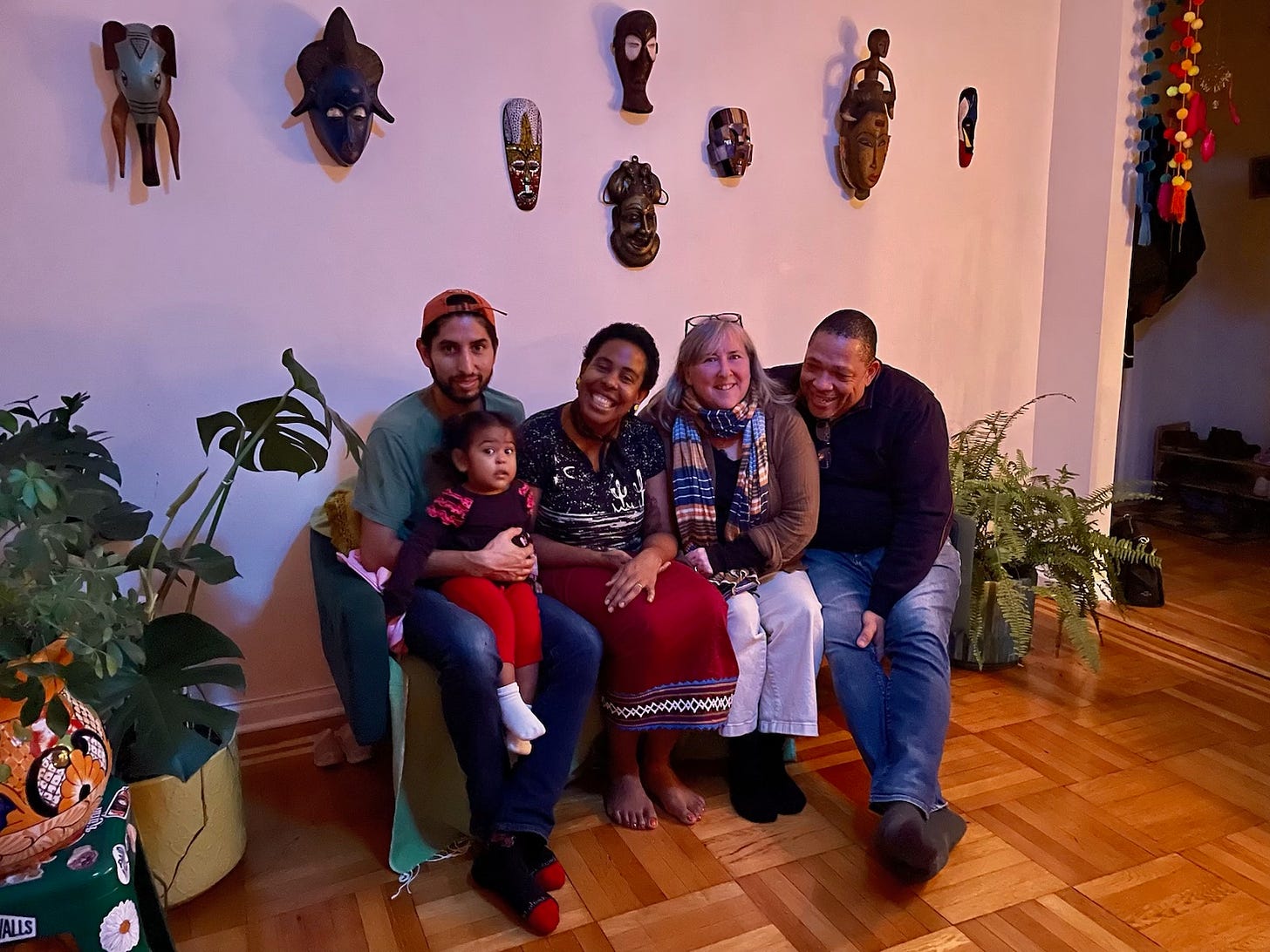
Thank you so much for highlighting our story!